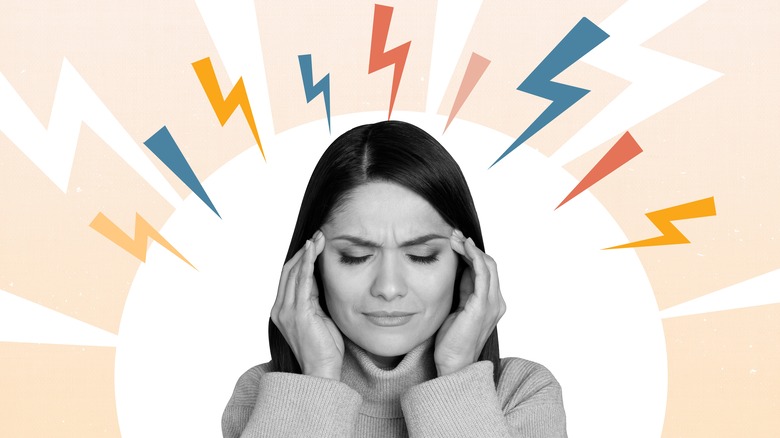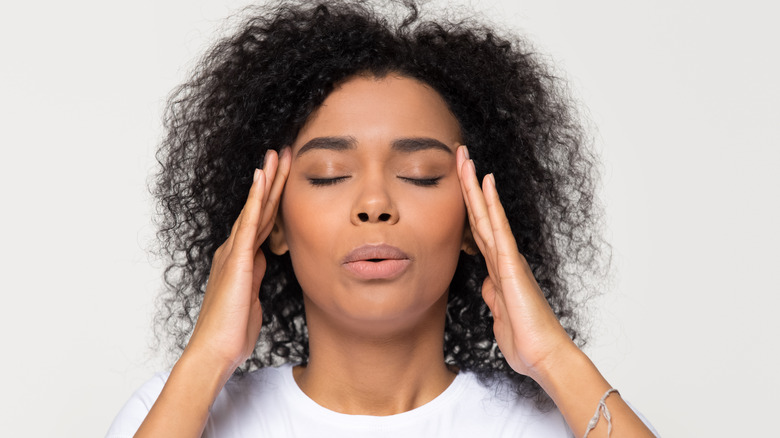Everything You Should Stop Believing About Migraines
Most of us are familiar with headaches, but if you've ever had a migraine, you know just how crippling the pain can be. Aside from the pain itself, what's also troubling is the fact that so many people who've never experienced a migraine don't have any understanding of what you're going through.
There are tons of myths surrounding migraines, so it's no wonder that even those who suffer from them sometimes start to believe the untruths. This is why it's important to arm yourself with the facts. For starters, migraines are classified as a neurological disease and are usually genetic, Dr. Amaal Starling, neurologist, explains in an article for the Mayo Clinic. She adds that no one experiences migraines the exact same way or at the same intensity.
Migraines are characterized by a severe, throbbing pain in the head that is sometimes accompanied by other symptoms like light and sound sensitivity as well as nausea and vomiting.
Various things can trigger migraines, and they will vary from person to person. Some people only deal with migraines every once in a while. Others find that this condition has a severe impact on their everyday life. Yes, migraines are serious and should be treated accordingly, so read on to discover some of the most common myths and the hard facts that contradict them.
A migraine is nothing to worry about
It's common for people who've never experienced migraines to assume that it's just another headache that will pass and therefore isn't something to be concerned about. This couldn't be farther from the truth. "Most types of migraine are not serious; however, they can be chronic and sometimes debilitating and disabling if not adequately treated," Dr. Medhat Mikhael, pain management specialist, told Medical News Today.
A 2000 study review found that even minor migraines can have an impact on people's everyday lives and productivity levels. For some people, migraines are so severe that they need to take time off work to recover. Migraines can differ in severity, and some can lead to additional health risks if not treated. "There is a kind of migraine called hemiplegic migraine that tends to be familial, associated with neurological symptoms, aura symptoms proceeding the migraine, and can lead to stroke," Dr. Mikhael explains. This type of migraine can leave one side of a patient's body weak or paralyzed, although this is rare and typically resolves within a few days or a month. It's very rare that people are left with permanent paralysis, but it can happen.
Again, migraines are serious, so don't try to grin and bear with the pain. Speak to your doctor about prescribing treatment to help you manage these debilitating headaches.
A migraine is simply a very bad headache
While a migraine does indeed appear to occur in the same way a headache does, it is something entirely different and only a symptom of what is actually a neurological disease. "In fact, headaches are only one symptom of migraine, and some migraines don't have a headache at all," Dr. Jennifer McVige, board-certified pediatric neurologist, told Medical News Today. Those with migraines will usually experience additional symptoms, like impaired concentration and feeling nauseous and dizzy. Typically, migraines also cause people to become sensitive to noise and light. These symptoms won't accompany an ordinary headache.
"Migraines are like a headache plus, plus, plus," Dr. Merle Diamond told Prevention — adding that these headaches can wreak havoc on your life because they can take hours or even days to subside. She adds that patients often need prescription-strength medication to manage their symptoms.
Unlike headaches, migraines might also announce their presence ahead of time, according to Dr. Vernon Williams, board-certified neurologist, adding that people "might notice subtle changes in their daily routine up to a day or two before a migraine sets in — a sort of warning period" (via Medical News Today). These symptoms can be different for everyone, but Williams explains that experiencing depressive symptoms, yawning more than usual, feeling extra irritable, or noticing stiffness in your neck are common signs that a migraine might be on its way. Some people might experience an aura right before the migraine starts to set in.
It won't last very long
Unlike headaches, migraines really like to overstay their welcome. According to the NHS, normal headaches can last from 30 minutes to several hours. Migraines, however, can last several days. They consist of four stages: prodrome, aura, headache, and postdrome. These phases can slowly progress over the course of a week, according to the American Migraine Foundation. Yikes!
The prodrome stage is the "warning" stage, which typically consists of symptoms like constipation, food cravings, mood swings, water retention, a stiff neck, yawning all the time, or urinating more than normal (via the Mayo Clinic). Once the prodrome stage has passed, you might experience an aura, which refers to "visual disturbances" like observing light flashes or bright spots. Some people even temporarily lose their vision during this phase. An aura can also cause speech problems alongside a feeling of numbness or weakness on one side of the body.
After the aura, the pain arrives, which can last anything from four hours to three days without the help of medication. The pain might manifest as a throbbing or pulsing sensation on one or both sides of your head. During the migraine attack, you might also experience an intolerance to light and sounds. Some people even have a heightened sense of touch and smell. Nausea and vomiting are also common during this phase. Once the attack subsides, you'll enter the post-drome stage, which typically leaves people feeling elated or drained.
Over-the-counter drugs can safely treat a migraine
While most over-the-counter drugs can treat headaches successfully without any adverse side effects, the same cannot usually be said for migraines. According to WebMD, mild migraines can typically be treated effectively with over-the-counter medicine like aspirin or ibuprofen, but that doesn't mean it's the best option, especially if you get them on a regular basis.
"People think they can rely on OTCs for pain relief. And while they might help to some degree, they often don't tackle the associated, disabling migraine symptoms," Dr. MaryAnn Mays, neurologist, told the Cleveland Clinic. These medications can also cause some pretty serious side effects when taking them too often, and you might find yourself dealing with issues like stomach bleeding and ulcers, which is the last thing you need when migraines are already significantly impacting your life.
Prolonged use of over-the-counter drugs can also eventually start to cause headaches instead of helping them. "[I]f you have one to two migraine headaches per week, you can get into a medication overuse pattern that makes headaches worse," Dr. Mays says. If you suffer from gastrointestinal issues like irritable bowel syndrome or gastrointestinal esophageal reflux disease, these drugs can worsen those conditions as well.
If you frequently deal with migraines, it's best to ask your doctor for prescription medication that will deal with your migraine symptoms without exacerbating existing gut issues.
You can't prevent migraines
Many people have the misconception that migraines cannot be prevented. They just happen when they happen, and there's nothing you can do about it. This could not be farther from the truth. According to the Cleveland Clinic, there is proof that making certain changes to your lifestyle can help ward off migraines. Stress, which is one of the most common migraine triggers, can be managed by making time to exercise and practicing mindfulness like meditation. Sleeping enough and making sure you stay hydrated during the day can also have a big impact.
The Mayo Clinic suggests making sure you stay consistent with your meal times since prolonged fasting can actually make you more susceptible to migraines.
Keeping a migraine diary can also be very useful to help you pinpoint your triggers. Write down when your migraines start as well as a list of things you were busy with at the time of the attack. Knowing what triggers these headaches can be very helpful when it comes to preventing them in the future. You can also consider taking some supplements known to help prevent migraines, like CoQ10, magnesium, feverfew, and riboflavin. However, it's important to note that these compounds won't work overnight. It will take time to see results, so patience is key.
It's all in your head
Few things are as infuriating as dealing with a migraine and having your co-workers or spouse think that you're simply overreacting while you feel like your head is bursting at the seams. "[Migraines] can be very disabling," Lauren Green, board-certified neurologist, told Self, adding, "It's very hard to just push through a migraine and continue on with your day." For many, the only way to make the pain subside is to rest somewhere that is dark and quiet. Dr. Green says that the pain can typically last hours, and during that time people simply can't deal with noise or bright light. In fact, they can't do much at all except bear the pain while it lasts.
According to Healthline, many people think that migraines are a psychological disorder that shows up when someone is very stressed. This is not true. Yes, stress can trigger migraines, but it's not the main cause. A person's genetic makeup, along with the chemical and structural changes taking place in their brain, are responsible for these severe headaches. Stress simply pulls the trigger on an already loaded gun, so to speak.
If you don't have an aura, it's not a real migraine
Imagine being quizzed by someone about your migraines only to be told that they're not legit because you don't experience an aura beforehand. Maddening, right? The truth is that the aura does not the migraine make. An aura is simply one of many symptoms associated with migraines, and not everyone gets them, according to the Cleveland Clinic. This phenomenon is only seen in about 30% of people who experience migraines, and even those who deal with aural symptoms don't always get them with every migraine attack. At its core, an aura is a result of your nervous system acting up during a migraine (via the Mayo Clinic).
While auras typically manifest as visual disturbances, like bright flashes of light and temporary vision loss, they can also affect other parts of the body. Some people experience muscle weakness or even complete numbness in certain parts of their body, like their hands and faces, notes the Mayo Clinic. Some might even have trouble speaking. Experiencing an aura can be scary, and while it is associated with migraines, it definitely isn't the only qualifying symptom when it comes to diagnosing these headaches.
Caffeine causes migraines
You've probably heard this one before: Too much coffee will trigger a migraine. This is not necessarily true, so don't reach for the dreaded decaf just yet.
Caffeine and migraines have a complicated relationship. Excessive caffeine consumption may be a potential migraine trigger, but in moderate doses, it might be helpful. A 2020 study published in Nutrients concluded that quitting caffeine cold turkey can cause migraines as your body goes into withdrawal. The study also notes that the overconsumption of caffeine could cause chronic migraines. Researchers recommend people consume no more than 200 milligrams of caffeine (about two cups) on a daily basis. Overall, the study concluded that there isn't enough evidence linking caffeine to migraines to recommend patients cut it out of their diet completely.
On the flip side, caffeine can actually help relieve migraine symptoms. Yup, you read that right. "The reason caffeine eases migraines is still up for debate," Kylie Petrarca, registered nurse, told Prevention. "Some believe it narrows the blood vessels surrounding the brain and decreases blood flow to relieve the head pain. Others believe it impacts the receptors that influence pain signaling."
Some people find that drinking caffeine when they feel a migraine coming on helps ward off most of the pain, reducing the migraine's intensity, Dr. Jennifer McVige, board-certified pediatric neurologist, explains to Medical News Today. Of course, this doesn't mean that drinking tons of caffeine will help you get rid of migraines, and McVige warns against trying to use caffeine as a primary treatment.
Following a special diet can help cure migraines
If anyone ever tries to sell you a diet to cure your migraines, run in the opposite direction. There is no scientific evidence to prove that specific eating plans can help you get rid of these headaches, according to Healthline. In fact, only 20% of people have food sensitivities that can lead to the development of headaches and migraines (via the Cleveland Clinic).
A 2020 study published in Nutrients found that following elimination diets don't have any impact on migraine attacks. Instead, people often develop other issues like nutrient deficiencies in the process. If you're one of the 20% who do have food sensitivities that seem to trigger your migraines, board-certified family physician Dr. Timothy Wong, suggests you keep a diary of your migraines as well as the food you consume every day to get an idea of what might be causing it (if any). He told Prevention that this can be a difficult process and that patterns aren't always evident. However, if you do notice migraines after eating specific foods, try taking a break from them to see if your migraines improve.
The best thing you can do is to simply follow a healthy diet. Some vitamins and compounds found in certain foods might even help keep migraines at bay, according to the American Migraine Foundation. They suggest you add more whole foods like fruits, vegetables, and whole grains to your plate.
Taking more migraine medication can solve the problem
Ever heard that taking more meds will help you feel better faster when you suffer from a migraine? This is completely false. Yes, it might make sense to think it'll make a difference while you're in the thick of an attack, but you'll actually be causing more problems for yourself down the line. Spoiler alert: You'll be getting more headaches (and possibly migraines) instead of getting relief from them.
Overuse of medication among migraine sufferers is pretty common, according to a 2022 study published in the National Library of Medicine. In fact, four in five people who are diagnosed with medication overuse headaches take those meds to help ease migraines. Medication overuse headaches occur when people take medication more frequently or in higher doses than prescribed, according to GoodRx Health. Symptoms usually include experiencing a constant, nagging headache you can't seem to get rid of, which either keeps coming back after your meds wear off or feels worse when you get up in the morning.
Having a headache almost every day is another sign of medication overuse and so is feeling a dull barely-there headache that simply never seems to go away. Non-headache-related symptoms include feeling drained, nauseous, unable to concentrate, and feeling anxious and restless. Other complications like liver and kidney problems might occur, as well as gastrointestinal issues (via GoodRx Health).
It's vital that you make an appointment with your doctor if you feel your migraine medication is no longer effective.
You need an imaging scan to diagnose a migraine
One of the many things that make migraines so frustrating is that there's no test you can take to diagnose it. So if anyone's told you that an imaging scan will confirm you suffer from migraines, you now know that is total nonsense.
Speaking to Medical News Today, Dr. Medhat Mikhael explained that migraines are diagnosed clinically, and the only instance where a doctor will order an imaging scan is if you have other symptoms that might indicate another health problem. "Imaging is only indicated if the symptoms are not clear or there are neurological symptoms or warning signs," Mikhael says.
"There's no specific test to diagnose migraines," says board-certified pediatric neurologist Dr. Jennifer McVige. "[To make an accurate diagnosis], a doctor must identify a pattern of recurring headaches along with the associated symptoms continuing for at least 3 months."
In some cases, your doctor might suspect that you suffer from migraines but would refer you to a migraine specialist to confirm the diagnosis, Dr. MaryAnn Mays, neurologist, told the Cleveland Clinic. She adds that you shouldn't suffer in silence — it's vital you speak to your doctor if you experience severe headaches that include all the symptoms of a migraine. They can prescribe treatment that can help you manage the pain.
Men don't get migraines
According to an article published in Nature, women develop migraines up to three times more than men. However, one in 13 men deal with migraines, according to Healthline. Doctors are still trying to figure out why women are more susceptible to these headaches.
According to the Migraine Research Foundation (via Forbes), around 39 million Americans suffer from migraines — 28 million of those people are women. Health professionals speculate that women's hormones might play a role in the development of migraines, but this doesn't mean that migraines are primarily caused by hormones.
"Migraine is not a hormonal disorder," says Michael Oshinsky, program director of pain and migraine at the National Institute of Neurological Disorders and Stroke at NIH. "That's a mistake. Think of it as a very diverse disorder. Each patient has to be diagnosed with her own criteria," he tells The Washington Post. Oshinsky adds that a migraine is "a disorder of the nerves and the brain" and that the root of the problem is likely related to some of the brain's pathways going a little haywire.
With that said, hormones might impact these pathways in some way, according to Elizabeth Loder, associate professor of neurology at Harvard Medical School. She says, "A researcher once said that 'the femaleness of migraine is inescapable.' "
Few studies have been conducted to figure out how migraines affect transgender people, but those that do currently exist suggest that cis- and transgender women are also more prone to migraines, while transgender men appear to be less likely to get these headaches (via Nature).













